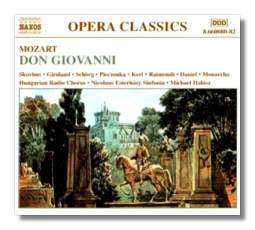
The Internet's Premier Classical Music Source
Related Links
- Mozart Reviews
- Latest Reviews
- More Reviews
-
By Composer
-
Collections
DVD & Blu-ray
Books
Concert Reviews
Articles/Interviews
Software
Audio
Search Amazon
Recommended Links
Site News
 CD Review
CD Review
Wolfgang Mozart

Don Giovanni
- Bo Skovhus (Don Giovanni)
- Renato Girolami (Leporello)
- Adrianne Pieczonka (Donna Anna)
- Regina Schörg (Donna Elvira)
- Torsten Karl (Don Ottavio)
- Ildikó Raimondi (Zerlina)
- Boaz Daniel (Masetto)
- Janusz Monarcha (Il Commendatore)
Hungarian Radio Chorus
Nicolaus Esterházy Sinfonia/Michael Halász
Naxos 8.660080-82 DDD 3CDs: 58:31, 58:38, 56:30
There are many good recordings of Don Giovanni available at less than full price; most of them feature famous singers and conductors. This new Naxos release is headlined by Bo Skovhus and his excellent realization of the title role. After that, the names are less familiar, and potential buyers might steer away from this set for that reason. However, it is a pleasure to report that this delightful presentation of Mozart's opera will disgrace no one's growing collection. Indeed, it has so much in its favor that it would be a worthwhile purchase at any price.
The threatening chords at the start of the overture suggest that this recording will emphasize drama over comedy. In fact, this beginning is something of a red herring, because Halász and company have created a sparkling Don Giovanni that makes the pulse race, and that makes the heart laugh more than it weeps. The conductor favors brisk tempos. Only occasionally do they seem driven (for example, Zerlina's and Masetto's wedding party); otherwise, Halász has a fine sense of Mozartean style. His orchestra has just the right weight for this performance, and it plays brightly.
In the title role, Bo Skovhus creates an impatient, arrogant man who can be quickly moved to anger and lust. When he turns on the charm, it's to get something that he wants. Even in the triumph of the "Champagne Aria" he calculates. Vocally, he's not the most individual Giovanni on discs, but his personality is a distinctive one, and his voice is young and full of animal spirits – in keeping with the character.
Similar comments can be made about most of the singers, really. Renato Girolami's Leporello contains all the elements of a classic buffo portrayal. At the same time, his bad temper and lustfulness make him a mirror of his master, and this makes the mistaken identities of Act Two (and Leporello's eventual repentance) all the more realistic. Similarly, Boaz Daniel's Masetto is more than a stupid country bumpkin, and his anger with Zerlina in "Ho capito, signor sì," and "Presto presto, pria ch'ei venga" deepens his character. The Commendatore of Janusz Monarcha is imposing.
With Don Ottavio, we get a treat in the person of tenor Torsten Kerl. No wimp Ottavios for him – he takes his role as Donna Anna's protector seriously. At first, I thought his "Dalla sua pace" was too aggressive, but when he reprises the aria's opening music, he sings it in a melting mezza voce, almost crooningly. Although Kerl won't match everyone's idea of what a Don Ottavio should be, he brings refreshment to a character that usually has nothing going for him but two beautiful arias.
Turning to the women, first is the Donna Anna of Adrianne Pieczonka. Infused with both pathos and nobility, her timbre is perfect for this role. She struggles a little with the coloratura of "Non mi dir," and her attacks are not as clean as I would prefer, but these are faults present in the Donna Annas of many a better-known soprano. Regina Schörg's Donna Elvira is more secure and (appropriately) flamboyant; it would have been interesting to hear her and Pieczonka trade roles. "Mi tradì" is first class. And finally, Ildikó Raimondi's Zerlina is no simpering soubrette. She might have been born a country girl, but she could stand shoulder to shoulder with Anna and Elvira. Every scene that she appears in crackles with spirit.
Naxos recorded this Don Giovanni in a Budapest recording studio. The sound is a little bright for my taste, but very clear. Even the usually messy separation of stage bands and pit orchestra in the Act One finale has been handled with aplomb. Sonically, there's nothing at all "budgety" about this recording!
Only two factors make this set a less than ideal purchase as a Don Giovanni for first-time buyers. First, although Naxos provides an Italian libretto, there are no translations of the sung text. (There is an English-language summary cued to each track.) Also, because this is the Prague version of the opera, Ottavio's "Dalla sua pace," Elvira's "Mi tradì," and the so-called "shaving scene" for Zerlina and Leporello are presented as an appendix at the end of Disc 3. There's nothing really wrong with this, but it is a potential source of confusion for people who don't know this opera.
All in all, this Don Giovanni is a big plume in Naxos' already feather-filled cap.
Copyright © 2002, Ray Tuttle


















